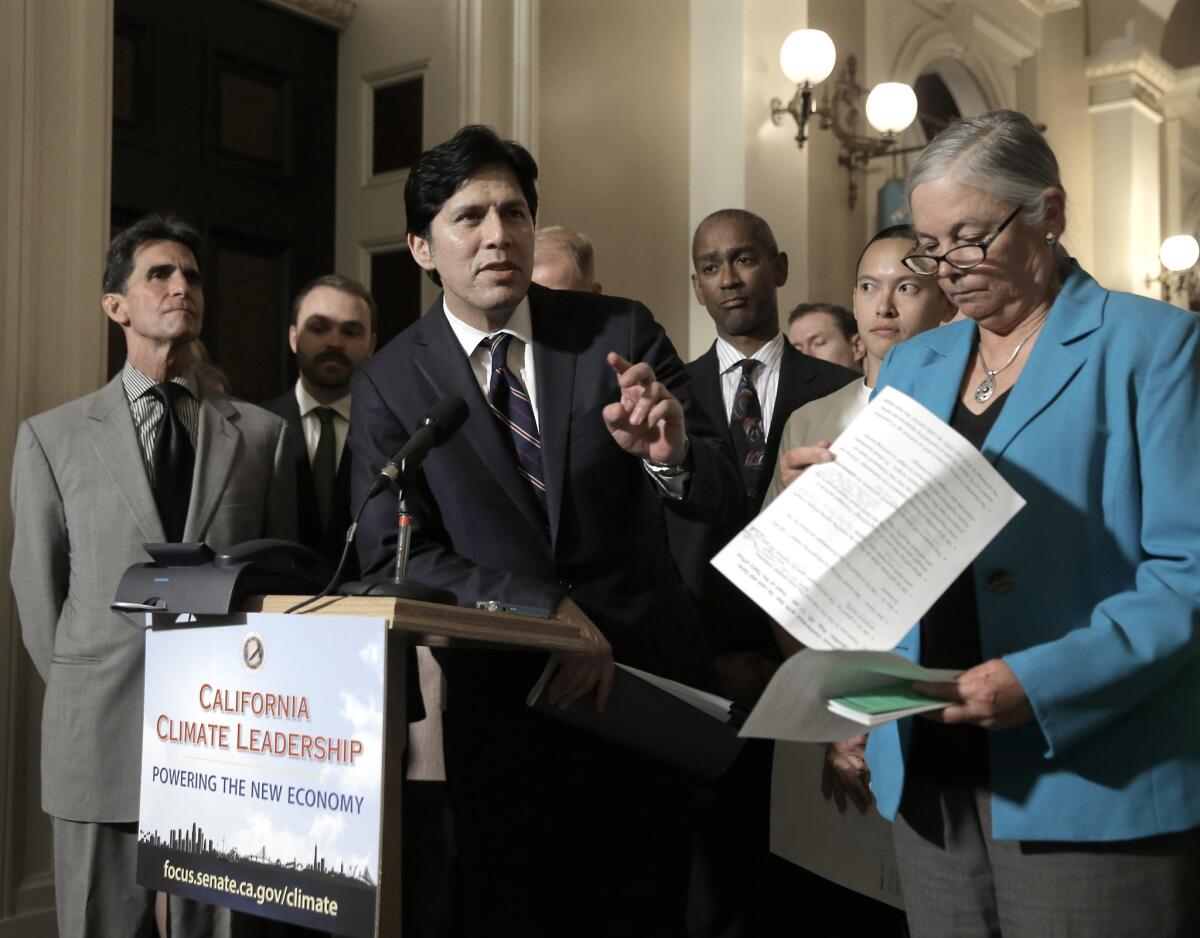What’s the deal with California’s controversial climate change bill?

State Senate President Pro Tem Kevin de Leon (D-Los Angeles) answers questions about SB350, which calls for boosting renewable energy use to 50% by 2030.
- Share via
SACRAMENTO — When Gov. Jerry Brown started his fourth and final term in January, he laid out three ambitious environmental goals for the next 15 years. First, double the energy efficiency of older buildings. Second, require half of California’s electricity to come from renewable sources. And third, slash petroleum use on state roads by half.
Those three targets — particularly the gasoline proposal — are contained in a bill that is the subject of intense debate in the Capitol. Lawmakers have until Friday night to decide what to do.
What’s the controversial bill?
It’s SB 350, by Senate leader Kevin de León (D-Los Angeles). If passed by the Legislature, it would solidify California’s role as a leading player in the fight against climate change. Senators have approved the measure; it’s pending in the Assembly.
What would happen to gasoline?
With transportation fuels accounting for 40% of California’s greenhouse gas emissions, Brown and De León want to find ways to reduce gasoline consumption. The measure would require the state Air Resources Board, a powerful regulatory agency, to determine how the state would cut petroleum use in half by 2030.
How would California reduce its use of gas?
Opponents of the bill have warned that regulators would start rationing gas, a move the governor said is not being considered. The Air Resources Board has said that California would make significant progress simply by ramping up existing programs. For example, the state is already working to reduce the amount of carbon in transportation fuels. Officials are also touting the benefits of more efficient vehicles, mass transit and better urban planning that would reduce the need for driving.
Why is this controversial?
Oil companies facing the prospect of lower sales in California are fiercely opposed, and they’ve launched an extensive advertising and lobbying campaign to stop the bill. Industry leaders, and some lawmakers, are concerned that the measure doesn’t include details for how to meet the gasoline target. They worry that regulators would be granted too much power.
Could the bill still change?
Yes, amendments to the legislation are under consideration right now. Most ideas are focused on increasing lawmakers’ oversight of regulators. New members could be added to represent low-income communities — places that often face high pollution but worry about affording technologies such as electric cars that would be an important part of new environmental regulations. Some lawmakers want any plan devised by the Air Resources Board to be subject to legislative approval.
What about the renewable energy part of the bill?
Existing law requires California to receive 33% of its electricity from renewable sources by 2020. Officials say utilities are on track to hit that target. The bill would set a new goal of 50% by 2030. Last week, some of the state’s biggest utilities pledged their support for the measure after changes were made that would allow them more flexibility in buying electricity generated by sources such as solar and wind.
What happens next?
It’s unlikely that there will be changes to the bill that would eliminate opposition from oil companies. But supporters are working to secure enough support in the Assembly to send the bill to the governor. If they don’t seal a deal by Friday night, the issue will need to hold until next year.
Twitter: @chrismegerian
ALSO
State lawmakers challenge Air Resources Board’s power over climate change rules
Gov. Brown prohibits ban on artificial lawns as voter turnout bill advances
With climate change and road repairs, Brown jumps into last-minute legislative fray
More to Read
Sign up for Essential California
The most important California stories and recommendations in your inbox every morning.
You may occasionally receive promotional content from the Los Angeles Times.














